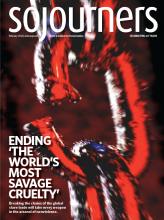ON OCt. 14, 2011, President Obama sent a letter to Congress saying he was sending two teams of “U.S. military personnel with appropriate combat equipment,” plus communications and logistics staff, to Uganda. The total of about 100 troops are there “as advisers to partner forces that have the goal of removing from the battlefield Joseph Kony” and other leaders of the Lord’s Resistance Army (LRA).
The importance of international attention to the LRA cannot be overestimated. Kony and the LRA have abducted more than 25,000 children, many of them from Northern Uganda, using them as soldiers and sexual slaves. The LRA has been marauding there—and more recently in the Democratic Republic of Congo (DRC), the Central Africa Republic, and South Sudan—for more than 20 years.
After years of urging U.S. attention to the violence perpetrated by the LRA—and hearing some voices in the region that supported the U.S. action—many human rights groups, including Resolve, the Enough Project, and Invisible Children, welcomed Obama’s decision.
But careful listening to important local religious leaders should raise some serious questions. On Oct. 24, the Acholi Religious Leaders’ Peace Initiative (ARLPI), a northern Ugandan group that includes leading Catholic, Anglican, and Muslim clergy from the area, issued a statement thanking the U.S. president and Congress for their “attention to the plight of our people,” including “efforts to achieve reconciliation and meet humanitarian needs in LRA-affected regions,” but expressing concern about “the military nature of the current strategy.” They wrote, “As history has taught us, military intervention is not the way to resolve the LRA conflict and achieve a sustainable peace. In the past, such approaches have directly resulted in the intensification of LRA violence and the increased endangerment of civilians.”
Read the Full Article
